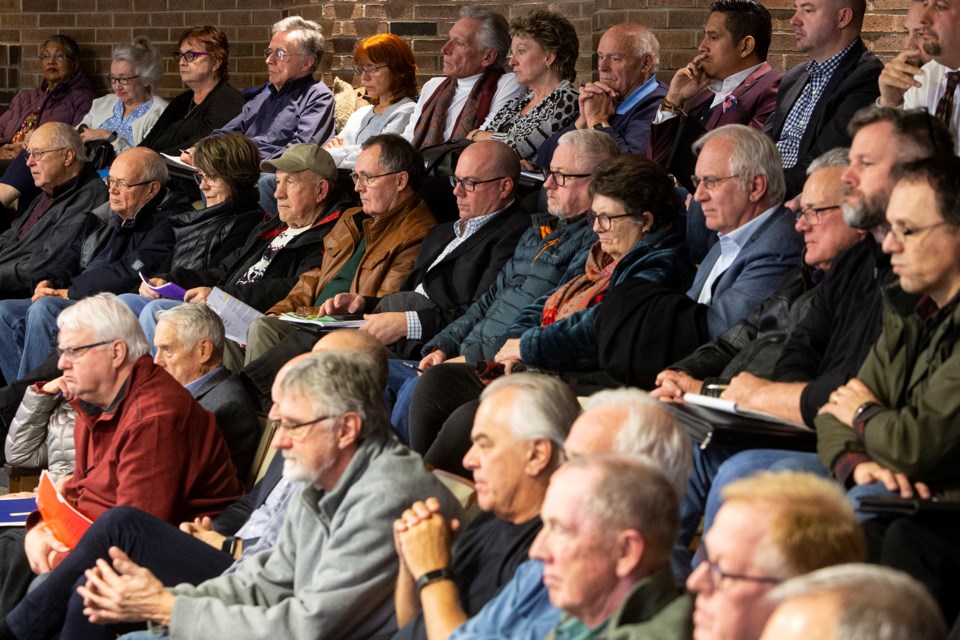City councillors deferred a major decision on the future of St. Albert's utilities until Dec. 16 Monday evening.
After residents came out en masse for a four-hour public hearing – many expressing either serious concern or outright opposition – council put off making a decision on forming an arms-length municipal utility corporation (MUC) so they have time to digest the feedback they received.City administration recommended the transition as a way to broaden the municipal revenue pie and earn annual dividends as the corporation’s single shareholder. Instead, council will approach the matter “with fresh eyes” during their Dec. 16 meeting.
Ten residents brought their concerns and objections before council during the public hearing, with many more sitting in the gallery at St. Albert Place, and council spent considerable time asking city staff questions about a business case for the MUC that was released publicly last month.
Coun. Wes Brodhead was not physically present but joined the meeting for a period of time by phone.
Elephant in the room
Coun. Sheena Hughes expressed major doubt toward the “elephant in the room” multiple times – whether there is an actual need to form a corporation to deliver new services, as opposed to adding new services to the city’s utility department.
She pointed out administrative costs to run the MUC are significantly higher than any revenue raised from new services.
“We have a loss of not paying for the administrative costs every single year in this business plan ... I don’t see how (we) can do this and not essentially pay for the administration costs without raising the rates,” Hughes said.
Financial projections for the MUC show it raking in $43.3 million in revenue in 2021, but just $2.13 million of that is raised from new services. Administrative costs in year one are estimated at $1.16 million.
Hughes noted Chestermere’s former MUC – which was reabsorbed by the city earlier this year – was subject to ballooning utility rates when an incoming CEO discovered the rate structure at the time was not covering cost.
A 10-year financial projection for St. Albert’s MUC forecasts the corporation would return an average $1.3-million dividend each year over the next 10 years.
St. Albert utilities and environment director Kate Polkovsky said the drive for an MUC really comes down to “speed to market.” It also provides a “yellow brick road” that says St. Albert is “open for business.”
“It really does provide those opportunities to very quickly provide those opportunities, to very quickly go outside our boundary and provide those sweat equity and joint partnership opportunities for different and unique opportunities that wouldn’t come to a city framework as it stands today,” she said.
Chief administrative officer Kevin Scoble said the business case presented is very conservative and focuses on traditional, St. Albert-oriented services for the first few years. The greater earning potential over time is outside of St. Albert, he added.
Not all of those potential services have been publicly contemplated. Scoble said there are new services administration is considering that were not included in the business case in order to retain “competitive advantage.”
New services publicly considered by the MUC case include offering garbage services to multifamily and commercial properties, a small wastewater treatment plant, harnessing waste-to-energy technology and offering inspection, maintenance and consulting services.
During a presentation on justifying the need for an MUC, Scoble said all current levers for both revenue and expenses are currently being pulled, and they cannot be pulled much further without breaking.
“In the absence of new revenue sources, these levers will break and bring negative consequences,” he said.
Risks
While the consultant St. Albert worked with to create a case for the MUC did come up with a list of potential risks, “no listings of risks is complete,” Polkovsky said.
“I think it’s very important that all of council and the public understands that no listing of risks is complete,” she said. “It will change based on market fluctuations, based on the realities that are observed.”
Part of the case detailing risks was withheld from the public, but a descriptor of the risks says there are two that are “somewhat likely” with “catastrophic” impacts, before mitigation strategies are employed.
When asked by Coun. Ken MacKay why the risks were not publicly released, legislative director David Leflar said doing so would give away all the “most sensitive” information to potential competitors.
“It’s like the coach giving the full medical report of the players on the DL. It’s really not something you want to make public, if you feel you’re going to be competing for business,” he said.
After closing the public hearing at 9 p.m. city council had a motion sitting on the table recommended by administration to direct Scoble to take all necessary steps to form an MUC. However, council passed a motion to adjourn their decision until their Dec. 16 meeting.
Coun. Sheena Hughes voted against the motion, because of the risk of compromising the public hearing process by delaying a decision. After a public hearing is closed, council is unable to receive any new information relating to the subject.




